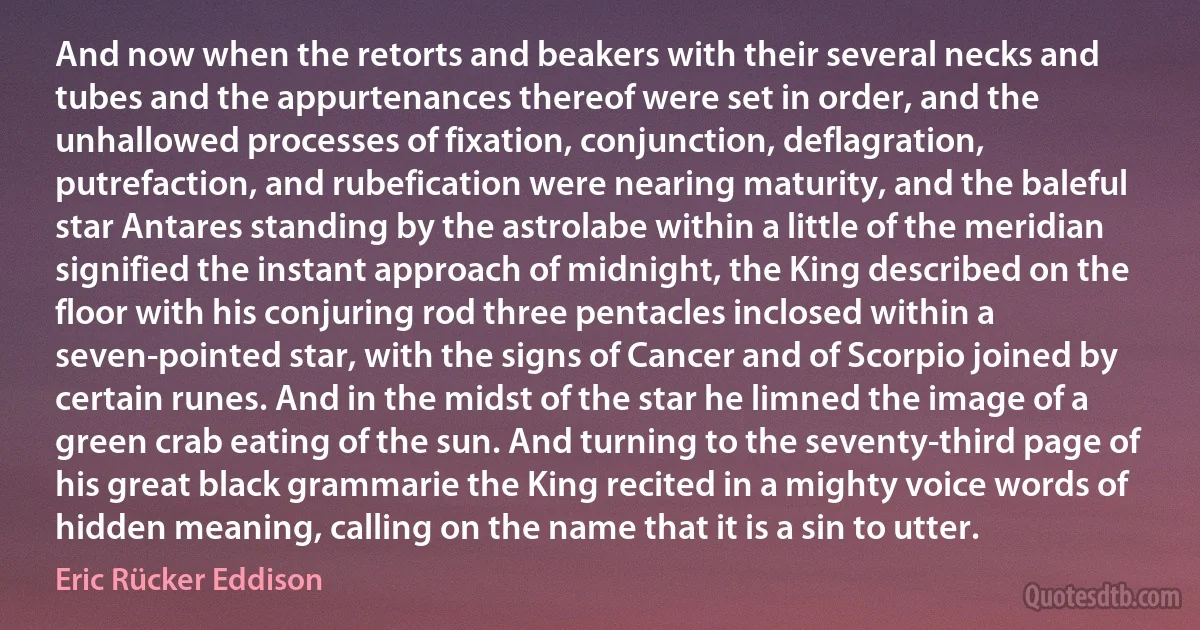
And now when the retorts and beakers with their several necks and tubes and the appurtenances thereof were set in order, and the unhallowed processes of fixation, conjunction, deflagration, putrefaction, and rubefication were nearing maturity, and the baleful star Antares standing by the astrolabe within a little of the meridian signified the instant approach of midnight, the King described on the floor with his conjuring rod three pentacles inclosed within a seven-pointed star, with the signs of Cancer and of Scorpio joined by certain runes. And in the midst of the star he limned the image of a green crab eating of the sun. And turning to the seventy-third page of his great black grammarie the King recited in a mighty voice words of hidden meaning, calling on the name that it is a sin to utter.
Eric Rücker EddisonRelated topics
approach black calling cancer certain conjunction conjuring crab eating fixation floor great green hide king meaning meridian midst mighty name now order putrefaction rod scorpio set signified sin standing sun three turning voice wordsRelated quotes
What is going on here is a deliberate revision by Current not only of Lincoln but of himself in order to serve the saint in the 1980s as opposed to the saint at earlier times when black were still colored, having only just stopped being Negroes. In colored and Negro days the saint might have wanted them out of the country, as he did. But in the age of Martin Luther King even the most covertly racist of school boards must agree that a saint like Abraham Lincoln could never have wanted a single black person to leave freedom's land much less bravery's home. So all the hagiographers are redoing their plaster images and anyone who draws attention to the discrepancy between their own past crudities and their current falsities is a very bad person indeed, and not a scholar, and probably a communist as well.

Gore Vidal
As soon as the funeral of Augustus was over, a temple and divine worship were forthwith decreed him. The Senate then turned their instant supplications to Tiberius, to fill his vacant place; but received an abstruse answer, touching the greatness of the Empire and his own distrust of himself; he said that "nothing but the divine genius of Augustus was equal to the mighty task: that for himself, who had been called by him into a participation of his cares, he had learnt by feeling them, what a daring, what a difficult toil was that of government, and how perpetually subject to the caprices of fortune: that in a State supported by so many illustrious patriots they ought not to cast the whole administration upon one; and more easy to be administered were the several offices of the Government by the united pains and sufficiency of many."

Tiberius
Behold therefore, this England of the Year 1200 was no chimerical vacuity or dreamland, peopled with mere vaporous Fantasms, Rymer's Foedera, and Doctrines of the Constitution, but a green solid place, that grew corn and several other things. The Sun shone on it; the vicissitude of seasons and human fortunes. Cloth was woven and worn; ditches were dug, furrowfields ploughed, and houses built. Day by day all men and cattle rose to labour, and night by night returned home weary to their several lairs. In wondrous Dualism, then as now, lived nations of breathing men; alternating, in all ways, between Light and Dark; between joy and sorrow, between rest and toil, between hope, hope reaching high as Heaven, and fear deep as very Hell. Not vapour Fantasms, Rymer's Foedera at all!

Thomas Carlyle
Now, when our Lord was come to eighteen years,
The King commanded that there should be built
Three stately houses, one of hewn square beams
With cedar lining, warm for winter days;
One of veined marbles, cool for summer heat;
And one of burned bricks, with blue tiles bedecked,
Pleasant at seed-time, when the champaks bud--
Subha, Suramma, Ramma, were their names.
Delicious gardens round about them bloomed,
Streams wandered wild and musky thickets stretched,
With many a bright pavilion and fair lawn
In midst of which Siddartha strayed at will,
Some new delight provided every hour;
And happy hours he knew, for life was rich,
With youthful blood at quickest; yet still came
The shadows of his meditation back,
As the lake's silver dulls with driving clouds.

Edwin Arnold
Xenocrates the philosopher writes that at Athens out of all the laws of Triptolemus only three precepts remain in the temple of Ceres: respect to parents, reverence for the gods, and abstinence from flesh. Orpheus in his song utterly denounces the eating of flesh. I might speak of the frugality of Pythagoras, Socrates, and Antisthenes to our confusion: but it would be tedious, and would require a work to itself. At all events this is the Antisthenes who, after teaching rhetoric with renown, on hearing Socrates, is related to have said to his disciples, «Go, and seek a master, for I have now found one.» He immediately, sold what he had, divided the proceeds among the people, and kept nothing for himself but a small cloak. ... His most famous follower was the great Diogenes, who was mightier than King Alexander in that he conquered human nature.

Jerome
